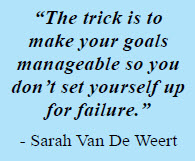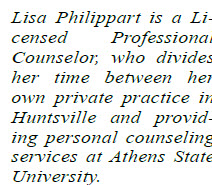Behavioral Activation Therapy
 By: Lisa Philippart
By: Lisa Philippart
Behavioral Activation Therapy (BAT) is a behavior-based form of psychotherapy rooted in a B.F. Skinner psychological model. But before you dismiss behavior therapy as antiquated or ineffective, give me a chance to share some information on how it works, particularly if you struggle with depression. Behavioral activation is a short-term treatment, as well as a basic coping strategy. When you feel depressed or anxious, you are less likely to do the things you enjoy, or avoid what may be potentially pleasurable activities. As a result, your mood will often worsen, making you feel even more isolated, detached, or anxious. This tendency to isolate increases your risk of depression. With behavioral activation, you identify specific goals each week and work toward meeting those goals. The goals you set take the form of pleasurable activities, consistent with the life you want for yourself. For example, if you want to become a more compassionate person, you might choose goals focused on volunteering, helping a friend, or making a donation.


Behavioral activation is designed to increase your connection to positively rewarding activities. When you notice yourself feeling anxious or depressed, you work on an appropriate activity. This teaches you that your behavior can affect your mood. Of course, the problem becomes when you are feeling low, it is difficult to feel motivated. There are some ways you can make your behavioral activation more effective. When getting started, a common mistake that people often make is to choose activities that are important to other people. You may find yourself choosing activities that you think you should be doing, rather than what you want to do. When selecting your activities, try to think of what’s uniquely important to you. Ask yourself, “What matters to me?” “What kind of life do I want to build for myself?” Then come up with specific activities that really mean something to you, and that are about your values and desires. Next, make sure that these activities are specific, and progress is measurable. For example, if you decide your activity is to get organized. What does that mean? What do you want to organize? I realize that when you are feeling down, it can be difficult to activate your behaviors. Therefore, you want to make sure that you can see progress quickly. Make a list of activities from easiest to hardest. Then choose a couple of activities that are going to be completed fairly quickly. In doing so, you make sure that you get active, but also don’t stress yourself out too much. Behavioral activation should not become overwhelming or stressful

You don’t want behavioral activation to become boring either. Mix it up when it comes to the activities that you choose. You may want to come up with activities from different life areas, such as work, relationships, personal care, and family or friends. The more variety you have, the more balanced your life will become and the more likely your motivation to continue. If you are finding it difficult to be motivated, you may want to ask others for support. Set up an accountability partner or establish a “contract” with a friend or family member. Let them know about what you hope to accomplish during the week. This person can check in with you during the week and also serve as your cheerleader to increase your motivation. Try to remember to be mindful and present when you are engaging in meaningful activities. Behavioral activation works best when you fully experience and participate in your chosen activities. You may want to start off slow with just a few activities, and from there gradually increase the number of activities as your mood improves. Finally, remember to reward yourself for the progress you make. Recognize your accomplishments. Doing so can increase your motivation to keep moving forward, especially during those times when your mood is down. With one step at a time, you can use behavioral activation to build a more meaningful and fulfilling life.
By: Lisa Philippart
Licensed Professional Counselor